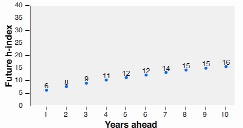Northwestern, September 12, 2012 | by Marla Paul
CHICAGO --- A medical school committee is weighing whether to hire a promising young neuroscientist. Will she have a brilliant future as a researcher, publish in top journals and nab abundant research funds?
If only there were a crystal ball. Wait, now there is!
A new Northwestern Medicine study published Sept. 13 in Nature offers the first formula that accurately predicts a young scientist's success up to 10 years into the future and could be useful for hiring and funding decisions.
Currently, hiring decisions are made using the instincts and research of search committees. Universities are increasingly complementing this with a measure of the quality and quantity of papers published, called the h-index.
 But the new formula is more than twice as accurate as the h index for predicting future success for researchers in the life sciences. It considers other important factors that contribute to a scientist's trajectory including the number of articles written, the current h index, the years since publishing the first article, the number of distinct journals one has published in and the number of articles in high impact journals.
But the new formula is more than twice as accurate as the h index for predicting future success for researchers in the life sciences. It considers other important factors that contribute to a scientist's trajectory including the number of articles written, the current h index, the years since publishing the first article, the number of distinct journals one has published in and the number of articles in high impact journals.
Try the prediction engine here: bit.ly/PLXDtAThe formula was developed in the lab of Konrad Kording, senior author of the Nature paper and associate professor in physical medicine and rehabilitation at Northwestern University Feinberg School of Medicine and a researcher at the Rehabilitation Institute of Chicago.
"The algorithm could be useful for hiring and tenure decisions as well as funding decisions, particularly at a time when funding agencies and hiring committees are dealing with vast number of applications," Kording said. "You want to fund someone who will have high impact in the future."
While the formula won't replace evaluation by a group of peers who examine scientific contributions and research depth, it could provide a valuable complementary tool, Kording noted. The predictions are targeted to a scientist at the level of assistant professor, someone within five to 15 years of writing his or her first paper as a Ph.D. student.
Kording and colleagues based and tested the formula on data from 3,293 scientists (3,085 neuroscientists, 57 Drosphila scientists and 151 evolutionary scientists) for whom they constructed a publication, citation and funding history.
Read more.
